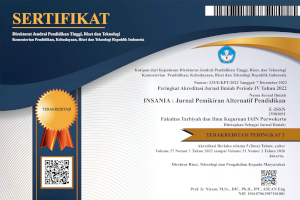Pembelajaran Terintegrasi Sains Dan Agama Islam Sebagai Upaya Pengembangan Karakter Peduli Lingkungan Pada Anak Sekolah Dasar
Pembelajaran Terintegrasi Sains Dan Agama Islam Sebagai Upaya Pengembangan Karakter Peduli Lingkungan Pada Anak Sekolah Dasar
DOI:
https://doi.org/10.24090/insania.v22i1.1177Abstract
Earth is currently in a condition that is quite severe. Environmental damage triggered primarily by human activity has had an impact that threatens the survival of life on earth. Climate change alters the ecological balance that results in natural disasters, water scarcity, and declining environmental quality. Efforts to improve the environment must be a priority and carried out by as many humans as possible. In fact, environmental awareness in Indonesia is still very low. One simple indicator, Indonesia is the second largest contributor of plastic waste in the world. If not addressed, this environmental damage will be felt by all parties. Efforts to increase environmental awareness need to start, one of them through elementary school bench. In line with the Penguatan Pendidikan Karakter (PPK) program, schools can make the environmentally caring character as target character so that learners become the generation that preserves and conserves the environment. Growing character must begin by providing a good understanding and environmental insight to the child as well as a sense of responsibility for himself, his community, and his God. Science learning and Islamic education is the most prospective entrance that teachers can take to foster environmental awareness.Downloads
Downloads
Published
How to Cite
Issue
Section
License
Authors who publish with this journal agree to the following terms:
Authors retain copyright and grant the journal right of first publication with the work simultaneously licensed under a Creative CommonsAttribution-ShareAlike License that allows others to share the work with an acknowledgment of the work's authorship and initial publication in this journal.
Authors are able to enter into separate, additional contractual arrangements for the non-exclusive distribution of the journal's published version of the work (e.g., post it to an institutional repository or publish it in a book), with an acknowledgment of its initial publication in this journal.
Authors are permitted and encouraged to post their work online (e.g., in institutional repositories or on their website) prior to and during the submission process, as it can lead to productive exchanges, as well as earlier and greater citation of published work (See The Effect of Open Access).








